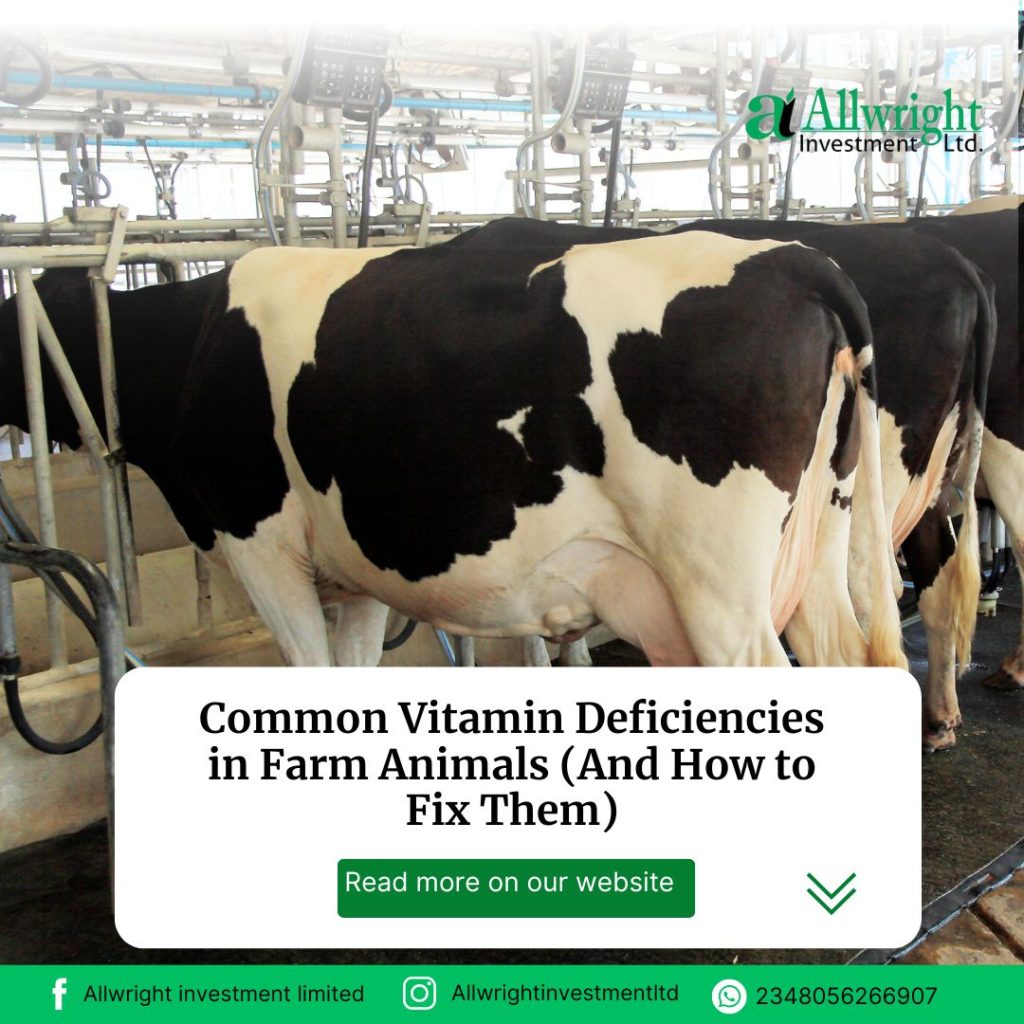
Proper nutrition is the foundation of healthy, productive livestock. However, even with high-quality feed, animals can suffer from vitamin deficiencies that lead to poor growth, weak immunity, and reproductive failures.
In this guide, we’ll cover the most common vitamin deficiencies in farm animals, their symptoms, and how to correct them with the right supplements and dietary adjustments.
1. Vitamin A Deficiency
Affects: Cattle, sheep, goats, pigs, poultry
Causes:
- Poor-quality forage (dry, old hay or overgrazed pasture)
- Lack of green feed (especially in winter)
- Liver damage (since vitamin A is stored in the liver)
Symptoms:
- Night blindness (stumbling, hesitant movement in low light)
- Rough coat, scaly skin
- Reduced fertility (weak calves, low conception rates)
- Weak immune system (higher infection rates)
How to Fix It:
✔ Feed fresh green forage, carrots, or sweet potatoes (rich in beta-carotene, which converts to vitamin A).
✔ Provide vitamin A supplements (oral drench, injectable, or fortified feed).
✔ Ensure proper liver function (avoid moldy feed, which damages the liver).
2. Vitamin D Deficiency
Affects: All livestock, especially young and indoor-raised animals
Causes:
- Lack of sunlight (animals raised indoors or in dark barns)
- Poor mineral balance (high phosphorus, low calcium diets)
Symptoms:
- Rickets (soft, deformed bones in young animals)
- Weakness, lameness, or fractures
- Reduced milk production in dairy cows
How to Fix It:
✔ Allow daily sunlight exposure (UV rays help animals produce vitamin D naturally).
✔ Supplement with vitamin D3 (in feed, water, or injections).
✔ Balance calcium & phosphorus ratios in feed (ideal ratio: 2:1 Ca:P).
3. Vitamin E Deficiency
Affects: Cattle, sheep, poultry, pigs
Causes:
- Feeding rancid or oxidized fats (destroys vitamin E)
- Selenium-deficient soils (vitamin E works closely with selenium)
Symptoms:
- White muscle disease (weakness, stiff gait, heart failure in calves & lambs)
- Poor fertility (low sperm count, weak embryos)
- Nervous system issues (muscle tremors, difficulty standing)
How to Fix It:
✔ Provide fresh, high-quality grains & forage (avoid stale feed).
✔ Use vitamin E + selenium supplements (injectable or oral).
✔ Test soil & forage for selenium levels (if deficient, supplement accordingly).
4. Vitamin B Complex Deficiency
Affects: Poultry, pigs, ruminants (especially young animals)
Causes:
- Grain-heavy diets (low in B vitamins)
- Rumen dysfunction (in cattle, since rumen microbes usually produce B vitamins)
- Stress or illness (increases demand for B vitamins)
Symptoms:
- Poor growth & appetite loss
- Neurological issues (staggering, convulsions in pigs & poultry)
- Anemia & weakness
How to Fix It:
✔ Supplement with B-complex vitamins (especially B12 for ruminants).
✔ For poultry & pigs, add yeast or liver meal (natural B-vitamin sources).
✔ Support rumen health in cattle with probiotics.
5. Vitamin K Deficiency
Affects: Poultry, pigs, newborn livestock
Causes:
- Moldy feed (contains mycotoxins that block vitamin K absorption)
- Antibiotic overuse (disrupts gut bacteria that produce vitamin K)
Symptoms:
- Excessive bleeding (from minor wounds or injections)
- Weak eggshells in poultry
- Blood in stool
How to Fix It:
✔ Provide fresh green forage (rich in vitamin K1).
✔ Supplement with vitamin K3 (menadione) in feed or water.
✔ Avoid moldy feed & unnecessary antibiotics.
Preventing Vitamin Deficiencies in Livestock
✅ Test feed & forage regularly for nutrient content.
✅ Rotate pastures to ensure fresh, nutrient-rich grazing.
✅ Use high-quality supplements tailored to your animals’ needs.
✅ Monitor for early symptoms (weight loss, poor coat, low productivity).
Vitamin deficiencies can silently reduce growth, fertility, and profitability in livestock. By recognizing the signs early and providing the right supplements, farmers can keep their herds healthy and productive.
At Allwright limited, we offer premium vitamin supplements for cattle, poultry, pigs, and more. Browse our products to give your animals the nutrition they need.
Need help diagnosing a deficiency? Consult our nutrition experts!

Leave a comment
You must be logged in to post a comment.